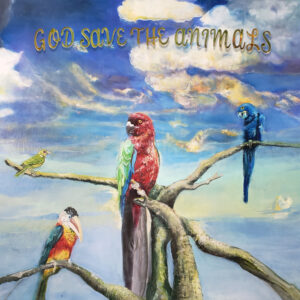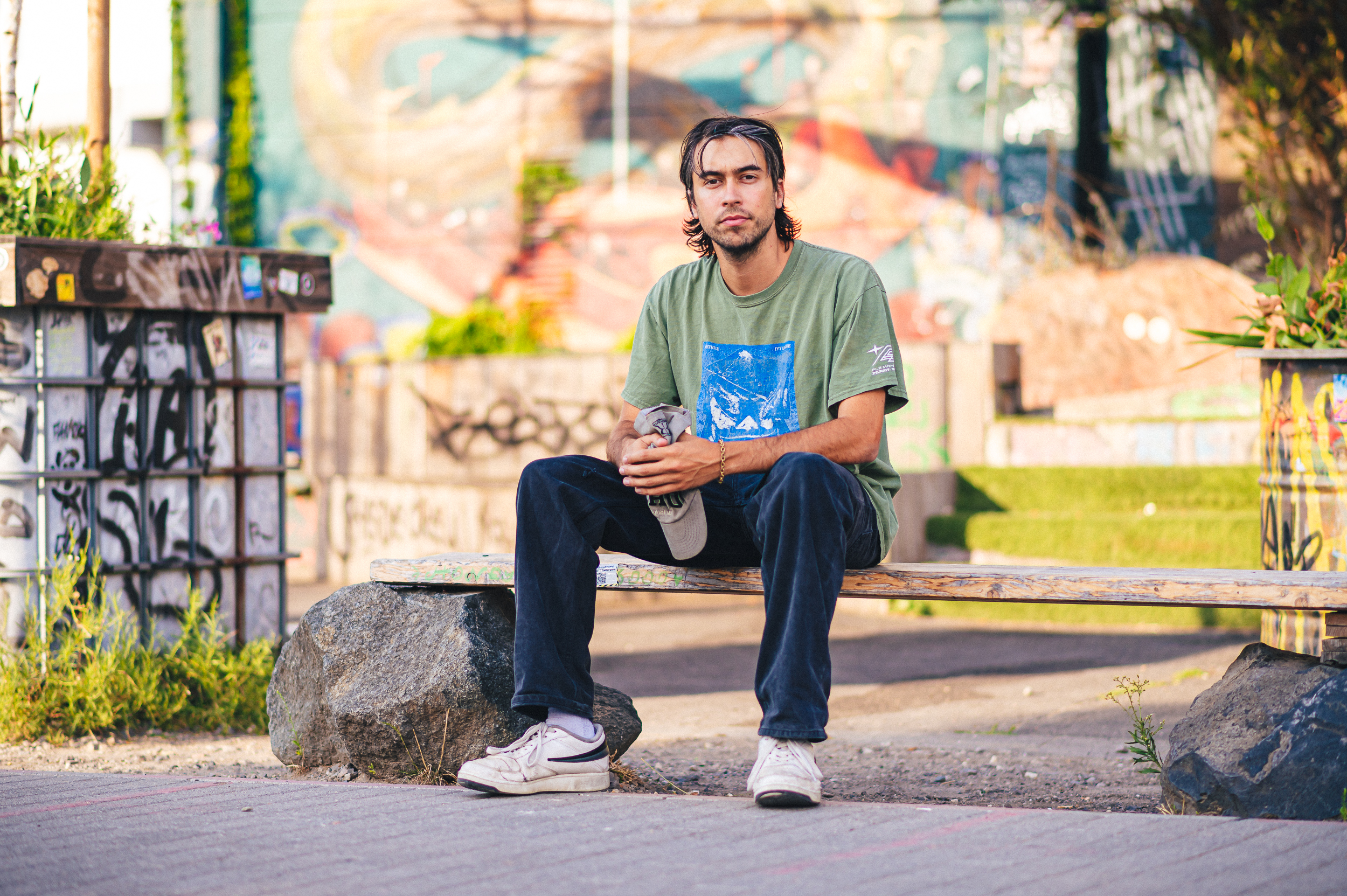Foto-© Pascal Swoboda
Alex G hat zuletzt schon sein neuntes Studioalbum God Save the Animals für den 23. September via Domino Records angekündigt – diese Woche erscheint es nun endlich. Gott spielt dabei nicht nur im Titel eine Rolle, sondern findet auch in mehreren der dreizehn Songs immer wieder Erwähnung, wenn auch nicht als konkrete religiöse Entität, sondern als Zeichen für ein allgemeines Gefühl des Glaubens (an etwas, irgendetwas), das Alex Giannascoli oder die von ihm verkörperten Charaktere in den oft angespannten Situationen der Songs stärkt. Der 29-jährige Musiker hat sich in den letzten Jahren zu Musikern wie Gillian Welch und Schriftstellern wie Joy Williams hingezogen gefühlt, zu Künstlern, die das Öffentliche und das Hermetische ausbalancieren und die den Glauben eher als eine gemeinsame soziale Sprache denn als religiöse Doktrin darstellen. Indem er seine Erfahrungen durch Fakten und Fiktion filterte, öffnete Giannascoli die Lieder auch durch eine praktischere Methode: die Zusammenarbeit.
Zwar schrieb und probierte er die Songs erstmal wie gewohnt zuhause aus, aber um neue Töne zu finden und um während der Pandemie „eine Routine außerhalb meiner Wohnung“ zu haben, begann er, mehrere Studios im Großraum Philadelphia zu besuchen. An God Save the Animals waren daher letztlich etwa ein halbes Dutzend Tontechniker beteiligt, die helfen sollten, die beste Aufnahmequalität zu erzielen – das Ergebnis ist ein Album, das in seiner Klangpalette und seiner Komplexität dynamischer ist als je zuvor. Wir sprachen mit dem Musiker über den Entstehungsprozess zum neuen Album und vieles mehr – unser Interview!
 You co-produced God Save the Animals with Jacob Portrait and recruited some engineers for the first time. And you’ve said in the past that you’re a bit of a control freak. So how was that for you?
You co-produced God Save the Animals with Jacob Portrait and recruited some engineers for the first time. And you’ve said in the past that you’re a bit of a control freak. So how was that for you?
It was nice. Usually, I record everything by myself at home. And so doing this one in a studio there was a lot more tracks and a lot more moving parts that I didn’t have a lot of experience with, so it was nice having people who were experienced on board to help me navigate through all that.
Yeah. You got even more experimental on this one. The song that immediately stood out to me was No Bitterness. I think this song is outrageous. You’ve leaned into the vocoder even more on recent stuff. And I’m wondering if you’ve been inspired by, like, Hyperpop, or are they are there sounds that you consciously wanted to incorporate onto God Save the Animals that you hadn’t explored on previous albums because you were in the studio?
Well, the strong influence for that break down part on No Bitterness was actually that song by Outkast, Hey Ya!. Yeah, I took the same drumbeat, you know. And then I must have heard vocals like that somewhere, but I can’t think of what I heard that I was emulating to make those vocals like that. I think I have tried to get vibey in the past on different albums, but maybe this one I just had more tools at my disposal to get it really out there, you know?
I wasn’t suggesting that your previous albums weren’t vibey.
I didn’t think that, but I know what you mean. On this one, I lean into the different styles a little harder maybe than the previous albums.
 Were there specific places you were pulling inspiration from that you were thinking about? Or is it just your sort of standard kind of like, “I’ll work on this song until it feels like it’s the song I want”?
Were there specific places you were pulling inspiration from that you were thinking about? Or is it just your sort of standard kind of like, “I’ll work on this song until it feels like it’s the song I want”?
On all of it I’m just working until it sounds right but there’s a couple of sounds that are really derivative of other sounds. On Early Morning Waiting, there was a Keith Richards song that I really wanted to emulate called Hate It When You Leave.
I don’t know that one.
It’s a later one by him, and it just has this really slow, repetitive drumbeat. I had the chords and the lyrics and stuff, but I was like, “where can I incorporate this drumbeat?” So that’s where that came from. And what else? Gillian Welch. There’s not only one song by her, but I think on Mission and Miracles, she was a big influence on those songs, just like the feel of them, I guess.
She’s amazing. She’s one of my favorite artists ever. Are you inspired at all by nursery rhymes? Because some of your songs have this, like, warped nursery rhyme feel. Runner kind of has a bit of that. I think Southern Sky kind of has that as well. I just wondered if you ever kind of were conscious of that and if you listened to nursery rhymes.
I guess I’m really conscious of rhythms in my lyrics. I think I write the lyrics phonetically first, or I write the melody kind of phonetically. And then I find words that fit really nicely into those syllables. And so, I think maybe how they’re so kind of gridlocked in there, maybe it makes it kind of how nursery rhymes are. The words are very rhythmic.

Have you noticed a theme weaved throughout the record?
There are references to faith more often than my previous records. But part of music is that it’s on the listener to make of it whatever they want, you know, I think that’s cool. As far as me, I think I was consciously trying to keep it open and not inhibit myself with some type of theme. This wasn’t me trying to make a faith record or something, I was just trying to make a good record. And then it happened to revolve around certain themes more often than others.
That was one of the other questions that I wanted to ask, was whether you care about how people interpret your music and whether you want people to understand it in a certain way. Because some artists, they get frustrated if they feel misunderstood. I think one of the cool things about your music is that the lyrics can often be quite elliptical, but you still manage to create kind of like a world that you feel like you live in for the record.
Thanks, I’m glad it has that effect on someone.
Lots of people, I think. Do you have any feelings about like how well-received you are now by publications and do you like read any reviews? If so, what do you think of those?
No, I try not to read them. I haven’t seen anything for this record, but the previous record I read a couple of things. When I first started, I would read more, but as time goes on, there are enough times where you read something, and it just puts you in a bad place. And I think I’ve learned to not put my hand on the stove anymore. I just don’t deal with it well.
Is it different making an album with a larger fan base each time, though?
I guess it’s nice feeling like my words will be taken seriously, or that people will put the time in to listen to what I’m saying. That awareness has pushed me to work harder and harder on my lyrics. I spend more time on my lyrics. I think in the past it was more of a haphazard thing, but now I labor over them because I feel like they’re going to be picked apart more than I thought they would be in the past.

Rough question: Why didn’t you play Blessing on Fallon? I thought that would be hilarious, especially the John Carpenter synth drop bit.
That would have been sick, I guess when they asked us, the label had Runner in mind and Fallon might have even asked specifically for Runner. I forget if it was the label or the show. I was so taken aback that we got asked to do it that, I was down for whatever. But yeah, Blessing would have been really interesting.
I just really like the image of the standard Fallon viewer watching you guys play Blessing.
Yeah, like, ‘what the hell is this?’ [Laughs]
 What do you do outside of music or on tour? What do you do with friends and what are your other hobbies?
What do you do outside of music or on tour? What do you do with friends and what are your other hobbies?
Not much anymore. I used to play pool a lot. Other than that I just think about writing all the time pretty much. And when I’m not doing that, I’m just like watching TV or reading a book, like normal recreational stuff that anybody does.
Do you have a favorite song you’ve written, either from God Save the Animals or your previous stuff?
Not really, I put the same amount of work into all of them and so it’s hard to choose. Other people have favorites, but it’s tough for me because the magic of the hooks and stuff is lost on me after I’ve played it so many times. I see them all as arts and crafts projects and they’re all kind of the same to me at this point. I guess sometimes if I see someone really loving it in the audience, then it kind of makes me feel it, but that’s pretty rare. It’s a good feeling getting to play the songs, performing is a rush for sure, but that feeling of writing the song, that never comes back. That only comes back when I write a new one, so I guess that’s part of my compulsion to keep writing because it’s a good feeling when you hit something that just works.
I really appreciate you making some time to talk with me, man. I’m a big fan.
Thank you. I appreciate you talking to me!










